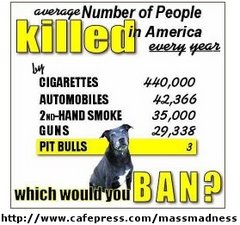Death-row dog gets a reprieve
Death-row dog gets a reprieve
Barbara Brown
Special to the Hamilton Spectator
(Jul 7, 2010)
Princess, formerly called a prohibited pitbull terrier, has a new lease on life.
The dog was ordered destroyed by Hamilton Animal Control last month after escaping her home and attacking a smaller terrier, causing bruising and puncture marks to the other animal.
The pitbull was seized and brought to the Dartnall Road pound, where a veterinarian estimated the dog was three or four years old. That would put Princess in the category of a prohibited pitbull under Ontario's 2005 Dog Owners' Liability Act and was an effective death sentence.
Princess, it turns out, was a lucky dog.
Fate, in the form of a more mature age, intervened to save her hide and set the dog on a new path to life outside the province, where pitbulls are not outlawed.
Jaime Stephenson, a Hamilton lawyer and animal advocate, stepped in to fight for Princess and was partly responsible for her stay of execution. She offered to pay for the dog to be spayed and shipped to an animal-rescue group in western Canada.
Jim Gillis, supervisor of municipal law enforcement for animal control services, agreed to postpone the animal's destruction pending an investigation into the dog's background and applicable legislation. The probe turned up a record that indicated Princess had been licensed as a pup five years ago.
The Dog Owners' Liability Act, which took effect in October 2005, banned the breeding, sale and ownership of pitbulls after several incidents in which the dogs attacked people. The law stipulated that a pitbull born within 90 days of the legislation being enacted would be grandfathered and could remain in Ontario as a restricted pitbull.
These pitbulls were required to be licensed, spayed or neutered and muzzled in public.
The new information changed Princess's status from a prohibited to a restricted pitbull.
The dog must still be removed from the province, Gillis said, because her owner had not been in compliance with the law.
He said a staff member trained in animal behaviour tested Princess under the SAFER (Safety Assessment for Evaluating Rehoming) criteria and found she was not aggressive toward humans or about food. The dog did behave aggressively toward other animals, however.
Stephenson met Princess for the first time yesterday at a Burlington veterinary clinic where the dog was taken to be spayed. She said the dog was relaxed and friendly and licked her face when she bent down to pet her.
In addition to a sizeable vet's bill, Stephenson has agreed to pay $15 a day for Princess to be boarded at the pound, pending her removal from the province.
The lawyer said she is in touch with several animal-rescue operations, but added Princess is less of a priority now that she is no longer slated for destruction.
"It's unfortunate that we don't hear about these situations more often because these animals are being put down in this province every day," Stephenson said.

































